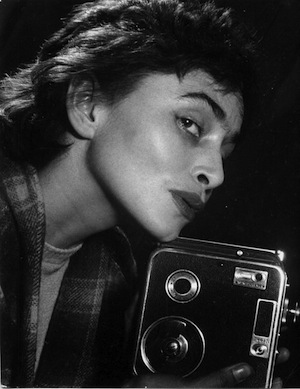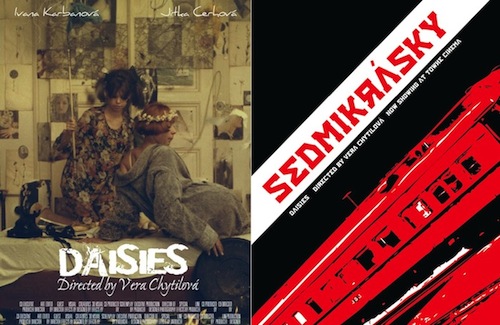The legendary director, who was among the leaders of the Czechoslovak Nová Vlna, with her bold visual experiments and inventions, has passed away
Famous for her brusque character, she was a pioneer of avant-garde cinema. For years banned from making films by government, she didn’t emigrate even after the 1968 Soviet invasion

(Photo: Czech Centre in Warsaw)
The film world is mourning the death of Věra Chytilová, known as “the first lady of Czech cinema”, one of the pioneers of the Czechoslovakian avant-garde cinema of the sixties, as well as the director of one of the classics of the Nová Vlna movement, the farcical comedy “Daisies” (Sedmikrásky) in 1966, which marked a radical departure from socialist realism focussing on the working class. She was distinguished by her daring, outspoken character and refusal to make compromises, even to the extent that following a ban on making films, she managed to convince the President to allow her to direct again, but nevertheless, her subsequent films would continue to attack the regime. Thanks to a career spanning five decades, Chytilová will be remembered not only for representing a female presence in a movement dominated by males, but also as the most anarchic and overtly political director of the group. She defined herself as “an overheated kettle that cannot be turned down”.
She was born February 2, 1929, in Ostrava, the steel heart of the republic, where the Catholic faith of her family deeply influenced her. “These moral codes are still inside me”, she always stressed, reiterating that all her films were moral comedies. After initially having studied philosophy and architecture in Brno, the young Chytilová worked as a technical illustrator and model, before getting in touch with the world of film in various jobs at Barrandov studios resulting even in a small role in the classic Císařův pekař a pekařův císař with the great Jan Werich in the lead role. In 1957 she was accepted in the prestigious FAMU in Prague, one of the oldest and most important film schools in the world, where she met Miloš Forman, Jan Němec, Jiří Menzel and her teacher, the legendary Czech director Otakar Vávra. She graduated in 1962.
The filmmaker took very little time to make her mark, directing her first feature film O něčem jiném (Something Different) in 1963, a film that focuses on the parallel lives of two girls: an athlete and a middle-class wife and absent-minded, unfaithful mother, both of whom are insecure and unsatisfied. Perličky na dně (Pearls at the deep), made two years later, a collective work inspired by the stories of writer Bohumil Hrabal, was a key work for the most important generation of Czechoslovak cinema; the Nová Vlna. The film should be remembered not so much for the final product, but particularly because the five directors, Věra, Jiří Menzel, Evald Schorm, Jaromil Jireš and Jan Němec, went on to form the backbone of the movement. The episode directed by Chytilová entitled Automat Svět, where we see a bride unexpectedly wandering around alone in the night after her wedding party, is often considered to be the most memorable. The film is also notable for the collaboration of Jiří Menzel, who was the assistant to the Ostrava born filmmaker during the filming of Something Different, a director who in addition to Chytilová, was perhaps the only one of the Nová Vlna able to adapt to the changes and restrictions after the period of normalization and continued to direct top drawer films.
If the name of Věra Chytilová has practically become a household name in her homeland and among young film fans, it is thanks to her most famous film, the experimental masterpiece Sedmikrásky from 1966, a grotesque, deliberately loosely plotted work, which seems to anticipate the flower power revolution, but also containing traces of nihilism that will bloom in the punk movement of the 70s. To summarize the plot (if you can define it as one), two young, attractive girls named Marie, both unfulfilled with their lives and the situation in the world, embark on a series of pranks and cause trouble, alternating between baths in the Vltava, nightclubs, bedrooms of fashion houses, as well as falsely enticing middle-aged men. A film on the banality of existence, but over the years it has been interpreted differently. For the director it represented a philosophical documentary in the form of a farce, while for others it was a cinematic translation of the poetry of the absurd by Samuel Beckett, Harold Pinter and even Václav Havel. Although it was considered a feminist work, Chytilová has always stated that her intention was only to make a film on individualism like a large number of the masterpieces of Nová Vlna. “If there’s something you do not like, do not follow the rules, break them. I am simply an enemy of stupidity in men and women”, she said in an interview with the British newspaper The Guardian in the year 2000. Few will be surprised, thus, that her film on freedom was banned by the same government that had financed the film, despite it winning the Grand Prix at the Bergamo film Festival in 1966.
Curiously, when the 1968 Soviet invasion put an end to the Prague Spring, Chytilová decided not to follow Forman, Ivan Passer and Němec, who had decided to emigrate to avoid the censorship. Of course, in later years she would had to accept the consequences of her choice. Her next film Ovoce stromů rajských jíme (The Fruit of Paradise: 1970), written by Ester Krumbachová, one of the most important writers in the industry of the time, is a stylized, modern reinterpretation of the story of Adam and Eve, in which the protagonists are Eva, her husband Josef, and Robert, a serpentine character who might be a serial killer. With its rapid cuts and visual distortion, the film had an approach which was too formalistic for the tastes of the authorities, and the filmmaker found herself being banned from directing for 8 years.

1976 represented a major turning point in the life of Chytilová. She received an invitation to present Sedmikrásky at a film festival dedicated to women in the United States. Věra responded by explaining that her government would not allow her to participate, and neither to make films. The International pressure on the Czechoslovakian government, in addition to a letter written by the director to the President at the time, Gustáv Husák, enabled her to receive the go-ahead for the production of Hra o jablko (1976, The Apple Game), which was awarded at the Chicago Film Festival in 1977, in which the main character is played by Jiří Menzel, who like the Ostrava-born filmmaker, was banned from directing for many years.
From this time on, she was able to work, despite the censorship and controversy generated from her work. Incredibly however, the director had lost none of her bite, especially with Panelstory (1981, Prefab Story), a sharp parody of the modern life of the new popular suburbs ot the socialist metropolises, in which one of the symbols of the communist era is attacked, the panelák, and conditions of these uninhabitable buildings. In the 80s, in addition to the short film Praha, neklidné srdce Evropy (1987, Prague the restless heart of Europe), among stand out films were Kalamita (1982), which again was censured because of her digs at the regime, and Vlčí Bouda (1987, Wolf’s Hole). The latter, on the surface seems like a simple genre film (sci-fi/horror), but has since been interpreted as an allegory on the atmosphere resulting from the years of normalization. The most successful film of the second half of her career however, remains Dědictví aneb Kurvahošigutntag (1992, The inheritance or Fuckoffguysgoodday), one of the best films ever made about the freedom of the period after 1989, where the director takes aim at the thirst for money and getting rich quickly, which she believes characterized the period in her homeland.
If her post ‘89 films lack the sharp bite of the previous ones, all of them until the very last one Hezké chvilky bez záruky (2006, Pleasant Memories), however, contain memorable scenes and clever ideas, and her death, on 12 March, will leave a huge void in Czech cinema. The young director Alice Nellis, a well-known name in today’s Czech film industry, once said, “she is crazy, this is clear, but I appreciate her ability to understand what is happening around us, and find metaphors for social problems”. It is evident that the best known exponent internationally of the Nová Vlna will always be Miloš Forman, but the works of Věra Chytilová stand out because they were the most radical, experimental, iconoclastic and particularly courageous.
by Lawrence Formisano




